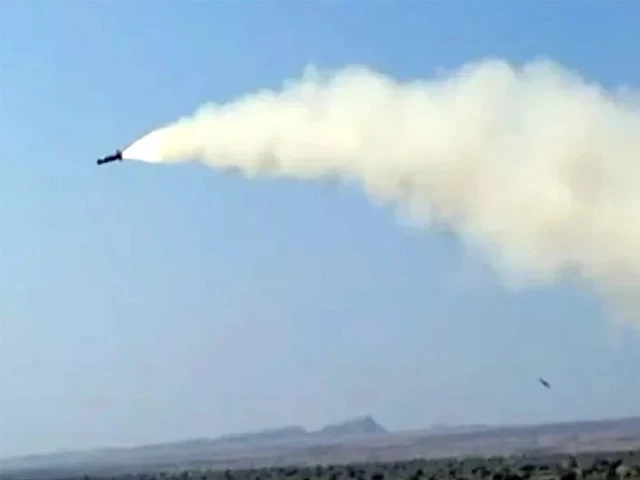Pakistan Army successfully test-fires Fatah-4 cruise missile
Fatah-4 will boost reach, lethality, and survivability of Pakistan Army missiles, says ISPR

The Pakistan Army successfully conducted a training launch of its newly developed Fatah-4, a ground-launched cruise missile, at a range of 750 kilometres.
The missile, developed indigenously, was tested on Tuesday and is equipped with advanced avionics and cutting-edge navigational aids, according to the Inter Services Public Relations (ISPR).
The Fatah-4 is designed to evade enemy missile defence systems due to its terrain-hugging capabilities, ensuring high precision when engaging targets. The missile’s features enhance its lethality and survivability, boosting the effectiveness of Pakistan’s conventional missile systems.
"As part of Army Rocket Force Command, Fatah-4 will further enhance the reach, lethality, and survivability of Pakistan Army’s conventional missile systems," said the ISPR statement.
Military leadership and observers
Today's launch was attended by senior military officials, including the Chief of General Staff, along with high-ranking officers from the Pakistan Armed Forces. The event also saw the presence of dedicated scientists and engineers who contributed to the missile's development.
In response to the successful test, the President Zardari, Prime Minister Shehbaz Sharif, Chairman of the Joint Chiefs of Staff Committee, and the Services Chiefs of Pakistan extended their congratulations to the troops, scientists, and engineers involved in the launch.
Pakistan-India Recent Conflict
During the recent conflict with India, on May 10, Pakistan launched Operation Bunyanum Marsoos and deployed its Al-Fatah missile and targeted multiple Indian military installations. However, after the intervention of US President Donald Trump, a full and immediate ceasefire was reached between India and Pakistan.
The latest escalation between Pakistan and India began on April 22, when an attack in Pahalgam killed 26 people. India immediately blamed Pakistan for the incident. However, Pakistan categorically rejected the Indian blame.
Read More: French intelligence official confirms downing of Rafale by Pakistan
In response, India undertook a series of hostile actions the next day on April 23, including suspending the 65-year-old Indus Waters Treaty (IWT), cancelling visas for Pakistani citizens, closing the Wagah-Attari border crossing, ordering the shutdown of the Pakistan High Commission in New Delhi, and reducing diplomatic staff at each other's embassies.
Tensions further escalated in the early hours of May 7, when missile strikes hit six cities in Punjab and Azad Jammu and Kashmir (AJK), destroying a mosque and killing dozens of civilians, including women, children, and the elderly.
Read: Pakistan never requested ceasefire: DG ISPR
In a swift military response, Pakistan’s armed forces shot down Indian warplanes, including three Rafale jets. The confrontation intensified again in the early hours of May 10, when India targeted several Pakistani airbases with missile strikes. In retaliation, Pakistan launched Operation Bunyanum Marsoos, damaging Indian military installations, including missile storage sites, airbases, and other strategic targets.
Later, US President Donald Trump announced that a ceasefire had been reached following intense diplomatic efforts overnight. Minutes later, the agreement was confirmed separately by Pakistan’s Foreign Minister Ishaq Dar and the Indian foreign secretary.





















COMMENTS (3)
Comments are moderated and generally will be posted if they are on-topic and not abusive.
For more information, please see our Comments FAQ